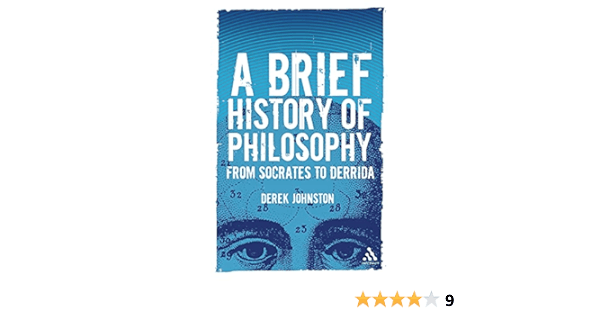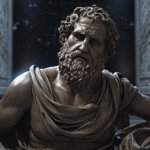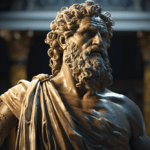Are you intrigued by the origins of human thought? Embark on a captivating journey through the history of philosophy, exploring the ideas that have shaped our world. From the ancient Greeks to modern thinkers, we’ll trace philosophy’s evolution and discover how it has molded our understanding of life, knowledge, and the universe. Get ready for an enlightening adventure as we delve into the roots of philosophy and its enduring impact on civilization.
A Brief History of Philosophy
Have you ever gazed at the stars and pondered the vastness of existence? That’s what philosophy is all about – contemplating life’s big questions. It’s a journey of curiosity spanning centuries, with thinkers from across the globe contributing their unique perspectives.
Back in the Day: Ancient Greece and the Birth of Big Thoughts
Picture this: Greek philosophers lounging in togas, debating the intricacies of life, the universe, and everything in between. That’s how it all began! These early thinkers, such as Plato and Aristotle, were captivated by the world around them. Plato, with his abstract thinking, believed in a realm of perfect forms, while the more grounded Aristotle emphasized logic and observation. These figures laid the groundwork for Western thought as we know it.
The Middle Ages: When Faith Met Reason
Centuries later, Christianity emerged as a dominant force. Thinkers like Augustine and Aquinas sought to reconcile religious beliefs with the wisdom of the Greeks. This era, marked by the pursuit of harmony between faith and reason, profoundly impacted Western thought for generations.
A Time for Change: The Dawn of Modern Thought
The 17th century ushered in an era of dramatic transformation. Reason and science took center stage during this period. Thinkers like Descartes, known for his famous declaration “I think, therefore I am,” and Locke, who championed individual rights, emphasized reason and experience, revolutionizing philosophical thought.
The Big Questions Never Get Old: Searching for Meaning
Despite advancements in knowledge, some questions remain timeless. Philosophers have always grappled with the meaning of life. Existentialism, a more recent school of thought, delves into this question, exploring the human condition in a seemingly meaningless world. Moral philosophy, another enduring branch, seeks to define right and wrong – a topic still hotly debated today.
A Global Tapestry of Ideas
Philosophy isn’t confined to Western thought. Throughout history, diverse cultures have developed unique philosophical perspectives. From the ancient philosophies of China to the rich traditions of India and Africa, these varied viewpoints enrich our understanding of the human experience.
Science and Philosophy: A Powerful Partnership
In the modern era, science has profoundly influenced philosophy. The scientific method, with its focus on observation and experimentation, has provided new avenues for understanding knowledge and the world. Science and philosophy, in many ways, complement each other in the pursuit of truth.
Why Philosophy Still Matters Today
You might be asking yourself, “Why should I care about the musings of philosophers from ages past?” Their ideas remain surprisingly relevant! Philosophy nurtures critical thinking, challenges assumptions, and helps us navigate life’s complexities. It’s an ongoing journey of exploration that continues to shape our world.
Speaking of history, did you know that it’s more than just a collection of dates and names? History is a dynamic field that explores the past, constantly shaping and reinterpreting our understanding of bygone eras. To delve deeper into the concept of history, check out The Definition of History.
What is the Brief History of the Origin of Philosophy?
Let’s journey back to the wellspring of Western philosophical thought – ancient Greece. Picture a group of individuals gathered together, not for feasts or games, but to engage in the stimulating pursuit of knowledge. These weren’t your average folks; they were the first philosophers, driven by an insatiable curiosity to understand the “why” behind everything.
One such pioneer was Thales of Miletus, who lived around the 6th century BC. Thales was determined to unravel the mysteries of the universe. What was it composed of? Was there a single, fundamental element from which everything else arose? He proposed that water was this primordial substance – a radical concept for its time! While we might find his conclusion charmingly simplistic today, it represented a pivotal shift from relying on myths and legends to seeking natural explanations for the world around us.
The Golden Age of Athens marked a period of flourishing for philosophy. It was during this era that iconic figures like Socrates, Plato, and Aristotle emerged. These philosophical giants engaged in lively debates in public spaces, grappling with timeless questions such as “What is justice?”, “What constitutes a good life?”, and “What is the nature of reality?”. These weren’t merely academic exercises; they sought concrete answers, laying the foundation for Western philosophy as we know it.
The impact of Greek thought extended far beyond its geographic borders. During the Middle Ages, scholars integrated Greek philosophy with religious doctrines, leading to the development of new schools of thought. The Renaissance witnessed a resurgence of interest in classical ideas, fueling a renewed focus on human reason and experience.
The modern era presented its own set of philosophical challenges. Scientific discoveries were challenging long-held beliefs, prompting thinkers like Descartes and Locke to reconcile these advancements with our understanding of ourselves and the universe.
It’s crucial to remember that philosophy wasn’t limited to the Western world. Different cultures around the globe cultivated their own rich philosophical traditions. Islamic scholars synthesized Greek thought with their faith, while Indian and Chinese philosophers offered profound insights into human existence.
Key Takeaways:
- The seeds of philosophy were sown in ancient Greece, where thinkers like Thales challenged traditional myths and sought rational explanations for the natural world.
- Socrates, Plato, and Aristotle, the “rockstars” of Greek philosophy, grappled with fundamental questions that continue to intrigue us today.
- Philosophical thought transcended geographical boundaries, influencing and being influenced by various cultures and belief systems.
- The rise of modern science presented new philosophical challenges, prompting thinkers to re-evaluate the nature of knowledge and reality.
- Philosophy is an ongoing dialogue, evolving as we continue to explore fundamental questions about ourselves and the universe.
What is Philosophy of History Summary?
Having explored the origins of philosophy, let’s delve into a specialized branch – philosophy of history.
Imagine history as a giant jigsaw puzzle. We have countless pieces – events, individuals, ideas – but assembling them into a cohesive and meaningful picture is no easy task. Philosophy of history provides a framework for understanding and interpreting these historical fragments.
Think of it this way: philosophy of history is less about what happened and more about how we understand and interpret historical events.
There are two primary camps within philosophy of history: traditionalists and analysts.
Traditionalists, as their name suggests, take a broader view. They seek overarching narratives and explanations for the grand sweep of history. Imagine them searching for the common threads that connect seemingly disparate events, such as the rise and fall of empires or the enduring impact of particular ideologies.
Analysts, on the other hand, are more detail-oriented. They meticulously examine the methods historians employ to reconstruct the past – the use of evidence, the interpretation of sources, and the construction of historical arguments.
It’s important to remember that there’s no right or wrong way to approach philosophy of history. It’s a dynamic field characterized by diverse perspectives and ongoing debates. Some experts believe in cyclical patterns throughout history, while others see it as a linear progression or a series of unique and unpredictable events. And guess what? We may never have definitive answers to all of history’s riddles!
Here’s a simple breakdown:
| Branch of Philosophy of History | Focus | Example |
|---|---|---|
| Traditional | Big Picture Narratives | The idea that history is driven by the struggle between classes (Marxism) |
| Analytical | Methods and Evidence | Examining how historians use primary sources to reconstruct past events |
The next time you delve into a historical account, take a moment to consider the philosophical underpinnings. What assumptions does the author make? What methods do they employ? By pondering these questions, you engage with the philosophy of history, enriching your understanding of the past.
What is Philosophy Brief Summary?
We’ve explored the historical context, but what exactly is philosophy? It’s more than just pondering big questions for the sake of debate. Philosophy is a way of thinking, a lens through which we examine the world and our place in it. It’s about cultivating critical thinking, logic, and a deeper understanding of ourselves and the universe. By questioning our assumptions, beliefs, and experiences, we gain a richer, more nuanced perspective on life.
Think of philosophy as having distinct branches, each focusing on a particular aspect of existence:
- Ethics serves as our moral compass, guiding us through the complexities of right and wrong and helping us navigate the challenges of living a good life.
- Metaphysics delves into the nature of reality itself. What is real? What is the nature of existence? These mind-bending questions lie at the heart of metaphysics.
- Epistemology grapples with the nature of knowledge. How do we know what we know? What are the limits of human understanding? Epistemology explores the very foundation of our beliefs.
- Logic provides the tools for clear and rigorous thinking. It teaches us to construct sound arguments, identify fallacies, and navigate the world of ideas with precision.
Throughout history, philosophers have pondered an astounding array of questions, and their ideas have shaped civilizations, sparked revolutions, and challenged conventional thinking.
Let’s meet some of the philosophical heavyweights:
- Socrates, renowned for his relentless questioning, believed that true knowledge stemmed from rigorous self-examination and challenging assumptions.
- Plato, Socrates’ student, proposed the theory of Forms, suggesting a realm of perfect concepts existing beyond the physical world.
- Aristotle, another titan of philosophy, made significant contributions to logic, physics, and ethics. He emphasized observation as a pathway to understanding universal principles.
- René Descartes, famous for his declaration “I think, therefore I am,” stressed the power of reason and individual thought.
- Immanuel Kant explored the limits of human knowledge and the complexities of morality. He argued that our minds shape our perception of reality.
These are just a few of the brilliant minds that have shaped philosophical discourse. Their ideas continue to influence our culture, politics, and understanding of the universe.
Importantly, philosophy isn’t a static subject confined to textbooks. It’s a dynamic way of thinking that empowers us to make sense of the world and lead more fulfilling lives. It’s about embracing the “why” questions, acknowledging ambiguity, and remaining open to new perspectives.
Remember, philosophy is a journey, not a destination. There are no fixed answers, only ongoing conversations and evolving perspectives. Embrace the uncertainty – it’s all part of the adventure.
What is a Short History of Modern Philosophy About?
Modern philosophy wasn’t just a collection of abstract ideas; it represented a seismic shift in how humanity viewed the world. For centuries, religious doctrines and ancient traditions provided the dominant lens for understanding reality. However, around the 17th century, a new breed of thinkers emerged, questioning these established frameworks and championing the power of reason and observation.
This era witnessed the rise of two prominent schools of thought: rationalism and empiricism.
Think of rationalists, led by figures like René Descartes, as champions of logic. They believed that true knowledge originates from within, from our innate capacity for reason and deduction. Descartes’ famous phrase “I think, therefore I am” perfectly encapsulates this perspective.
Empiricists, such as John Locke, championed the idea that all knowledge arises from sensory experience – from what we observe and interact with in the world.
Within this fertile ground of intellectual exploration, certain figures left an indelible mark on philosophical thought.
Francis Bacon, often hailed as the “father of empiricism,” advocated for the scientific method. He urged his contemporaries to abandon preconceived notions and embrace observation, experimentation, and inductive reasoning. Bacon’s work laid the foundation for the scientific revolution that would transform our understanding of the natural world.
Thomas Hobbes, another influential figure, introduced a materialistic perspective. He challenged the traditional mind-body dualism, proposing that all phenomena, including consciousness, could be explained in terms of matter and motion.
The impact of modern philosophy extended far beyond academic circles. It influenced the scientific revolution, our understanding of the human mind, and continues to shape contemporary debates on ethics, politics, and the nature of reality.
Key Takeaways:
- Modern philosophy, emerging in the 17th and 18th centuries, marked a departure from traditional modes of thought, embracing reason and experience as pathways to knowledge.
- Rationalists, like Descartes, emphasized the primacy of reason, while empiricists, such as Locke, championed sensory experience as the foundation of knowledge.
- Francis Bacon’s advocacy for the scientific method, emphasizing observation and experimentation, proved instrumental in advancing scientific understanding.
- Thomas Hobbes challenged traditional mind-body dualism, proposing a materialistic view that reduced all phenomena to matter in motion.
- The legacy of modern philosophy is profound, shaping not only scientific progress but also contemporary discussions across various fields.
This is merely a glimpse into the rich tapestry of modern philosophy. Countless thinkers, ideas, and debates have shaped our world, and their exploration offers a captivating intellectual journey.
Who is the Father of Philosophy?
As we delve into the history of philosophy, it’s tempting to ask: Who started it all? Who deserves the title of “Father of Philosophy?” It’s a question that has intrigued thinkers for centuries.
In the Western tradition, the honor often goes to Socrates, an Athenian philosopher who lived around 470-399 BCE. Socrates dedicated his life to questioning, challenging, and prodding his fellow citizens to examine their beliefs. He engaged people in thought-provoking dialogues, exposing inconsistencies and prompting them to seek deeper truths. His relentless pursuit of knowledge, even in the face of adversity, earned him a prominent place in philosophical history.
However, it’s important to acknowledge that philosophy, like many intellectual pursuits, likely arose independently in various cultures throughout history. Attributing its origin to a single “father” or “mother” would be an oversimplification. Just as different cultures developed unique languages, art forms, and belief systems, they probably explored philosophical ideas in their own distinct ways.
Consider ancient China, where renowned thinkers like Confucius and Lao Tzu profoundly influenced Chinese philosophy. Their ideas centered on ethics, social harmony, and living in accordance with nature – themes that resonate even today.
Fast forward to the 17th century, and we encounter René Descartes, a French philosopher who revolutionized Western thought. His famous declaration “I think, therefore I am” challenged traditional notions of certainty and sparked a new wave of philosophical inquiry.
Instead of seeking a single “founder,” it’s more accurate and enriching to acknowledge the contributions of numerous individuals across cultures and time periods. Approaching philosophy with this broader perspective reveals a rich tapestry of ideas, each thread contributing to our understanding of the human condition.
Here’s a glimpse at some influential figures in philosophical history:
| Region/Time Period | Philosopher |
|---|---|
| Ancient Greece | Thales of Miletus |
| Ancient Greece | Socrates |
| Ancient Greece | Plato |
| Ancient Greece | Aristotle |
| Ancient China | Confucius |
| Ancient China | Lao Zi |
| Modern (17th c.) | René Descartes |
Remember, this list barely scratches the surface! There are countless other fascinating thinkers and traditions waiting to be discovered. Embrace the joy of exploration, and never stop asking questions!
Why Did Philosophy Begin?
The emergence of philosophy is a bit like tracing a river back to its source – there are many tributaries and converging streams that contribute to its flow. While pinpointing a single origin remains elusive, we can explore some of the driving forces that likely led to its emergence.
Innate Curiosity: Humans are, by nature, curious creatures. We possess an innate desire to understand the world around us. From the vastness of the cosmos to the intricacies of the natural world, we’re driven to question, explore, and make sense of it all. This inherent curiosity probably played a significant role in sparking the first philosophical musings.
The Search for Meaning: Life can be a perplexing and, at times, chaotic experience. We face joy and sorrow, love and loss, triumphs and setbacks. Philosophy likely emerged as a way to find meaning and purpose amidst life’s uncertainties. It offered a framework for understanding our place in the grand scheme of things and for navigating the complexities of human existence.
Practical Concerns: Beyond abstract pondering, early philosophical inquiries likely addressed practical concerns. How should we live our lives? What constitutes a just society? How do we make ethical decisions? These questions have practical implications, and the search for answers likely fueled early philosophical thought.
The Power of Wonder: Imagine early humans gazing at the night sky, witnessing the cycle of seasons, or experiencing the awe-inspiring power of a thunderstorm. These experiences, filled with wonder and a sense of mystery, could have sparked early philosophical reflections. The desire to comprehend these phenomena, to move beyond simple explanations, may have laid the groundwork for more systematic philosophical inquiry.
While ancient Greece often takes center stage in discussions of Western philosophy, it’s crucial to remember that similar lines of inquiry were likely developing in other parts of the world. Different cultures, facing their own unique challenges and experiences, developed their own philosophical traditions.
It’s important to remember that philosophy isn’t a relic of the past. It’s an ongoing conversation, a continuous exploration of what it means to be human in an ever-changing world. The questions philosophy tackles are timeless, and the search for answers continues to shape our understanding of ourselves and the universe we inhabit.
What is the Origin of Life Philosophy?
The origin of life is a question that has captivated scientists and philosophers alike. While science delves into the mechanisms and processes that may have given rise to life, philosophy grapples with the deeper implications, questioning the very essence of life itself.
Imagine a group of philosophers gathered around, debating the mysteries of existence. Some might argue that life is a cosmic accident, a fortuitous combination of chemicals that sparked into being through purely random processes. Others might counter that the sheer complexity of even the simplest organisms suggests something more at play. Could blind chance truly produce such intricate and self-replicating systems?
This leads to questions about the nature of life itself. Is it solely defined by physical processes – cells dividing, energy being consumed, and information being transmitted? Or is there something more, an intangible spark that distinguishes living beings from inanimate matter? Some philosophers propose that life is inherently relational, defined by the complex interplay between organisms and their environment.
And then there’s the question of consciousness. Did life emerge with a built-in capacity for awareness? Or did consciousness arise later, as a byproduct of increasingly complex nervous systems? This question has profound implications for our understanding of ourselves and our place in the universe.
Here’s the exciting part – we’re still figuring it out! New scientific discoveries constantly reshape our understanding of life’s origins, while philosophical reflections push us to think beyond the boundaries of current knowledge. The quest to unravel this profound mystery is ongoing, with each new insight opening up a universe of possibilities.
The philosophical exploration of life’s origins is more than just an intellectual exercise. It challenges us to confront our place in the grand scheme of things, to ponder the nature of existence, and to appreciate the sheer wonder and mystery that surrounds us. It’s a journey of discovery that transcends disciplines, inviting us to engage with some of life’s most profound and enduring questions.
What are the Historical Periods of Philosophy?
The history of philosophy is a long and winding road, marked by distinct periods, each with its unique flavor and contributions. Let’s take a journey through these different eras, tracing the evolution of thought from ancient musings to modern-day inquiries:
Ancient Philosophy (circa 6th Century BCE – 5th Century CE): Imagine the sun-drenched shores of ancient Greece, where philosophy took its first tentative steps. This era witnessed the birth of Western philosophical thought, driven by an insatiable desire to understand the universe and humanity’s place within it. Towering figures like Socrates, Plato, and Aristotle graced this stage, their ideas laying the groundwork for centuries of philosophical inquiry. From ethics and politics to metaphysics and logic, they laid the foundation for Western intellectual tradition.
Medieval Philosophy (circa 5th Century – 15th Century): This period saw the rise of Christianity as a dominant force in Europe. Philosophy adapted, seeking to reconcile faith and reason. Thinkers like Augustine of Hippo and Thomas Aquinas became masters of weaving together theological doctrines with classical philosophical insights. This era grappled with the relationship between God and humanity, faith and reason, and the nature of the divine.
Renaissance Philosophy (circa 14th Century – 17th Century): A spirit of rebirth and rediscovery characterized the Renaissance. Thinkers turned back to the classics, embracing humanism and celebrating the power of human reason. This era marked a departure from the God-centered worldview of the Middle Ages, emphasizing human potential and achievement. Art, literature, and science flourished alongside philosophical exploration.
Modern Philosophy (circa 17th Century – 19th Century): The Scientific Revolution shook the foundations of knowledge, ushering in an era of reason and empirical observation. Thinkers like René Descartes and John Locke championed different aspects of this new way of thinking. Descartes, known for his method of radical doubt, emphasized the power of reason and deduction, while Locke championed empiricism, arguing that knowledge stems from sensory experience.
Contemporary Philosophy (circa 20th Century – Present): The 20th and 21st centuries have witnessed an explosion of diverse philosophical perspectives. From existentialism, which grapples with the meaning of existence in a seemingly absurd world, to phenomenology, which examines the nature of experience, to postmodern thought, which questions grand narratives and traditional power structures, contemporary philosophy is a vibrant and ever-evolving field. Thinkers like Jean-Paul Sartre, Simone de Beauvoir, and Michel Foucault have challenged conventional thinking, prompting us to re-examine our assumptions about knowledge, power, and the human condition.
The Journey Continues:
The beauty of philosophy lies in its open-ended nature. As we grapple with new challenges and discover new frontiers of knowledge, philosophical inquiry continues to evolve. From the nature of consciousness to the ethics of artificial intelligence, the future of philosophy promises to be as rich and thought-provoking as its past.
Want to Explore Further? Consider diving into texts on the history of philosophy, or explore the works of the philosophers mentioned above. The world of philosophy is vast and rewarding, offering a lifetime of intellectual stimulation.
Who was the First Philosopher in History?
Like many “firsts” in history, identifying the very first philosopher is a complex question with no easy answer. It’s like pinpointing the origin of a river; there are often many streams and tributaries that eventually converge into a single, identifiable source.
However, in the Western philosophical tradition, Thales of Miletus, who lived around 624-546 BCE in ancient Greece, is often credited with being the “first philosopher.” Here’s why:
Breaking with Mythology: Before Thales, explanations for natural phenomena were largely based on mythology and the actions of gods and goddesses. Thales, however, sought natural explanations for the world around him. He dared to question the traditional narratives and sought answers through observation and reason.
The Quest for the Arche: Thales believed that everything in the universe originated from a single, fundamental substance, which he called the “arche.” He proposed that water was this primordial substance, a radical idea for its time. While his specific conclusion might seem simplistic today, his endeavor to find a unifying principle underlying all of existence marked a significant departure from supernatural explanations.
A Man of Many Talents: Thales wasn’t just a philosopher; he was also a mathematician, astronomer, and engineer. He’s credited with developing geometric theorems, predicting a solar eclipse, and devising practical solutions to engineering problems. This multifaceted approach to knowledge highlights the interconnectedness of various disciplines in early philosophical thought.
A Catalyst for Change: While it’s impossible to know for certain if Thales was the absolute “first” to engage in philosophical thought, his influence on Western philosophy is undeniable. His emphasis on rational inquiry, his search for natural explanations, and his multifaceted approach to knowledge laid the groundwork for centuries of philosophical and scientific exploration.
Beyond the West: It’s important to note that other cultures, such as those in ancient India and China, had their own rich philosophical traditions developing independently around the same time. The quest for knowledge and understanding is a universal human endeavor, and it’s likely that individuals and cultures around the world were engaging in philosophical thought long before recorded history.
So, while Thales of Miletus holds a special place in the Western philosophical lineage, the true “first philosopher” may remain shrouded in the mists of time. What’s important is recognizing the spirit of inquiry, the courage to question, and the pursuit of understanding that drove these early thinkers and continues to inspire us today.
Who Said History is Philosophy?
The intricate relationship between history and philosophy has fascinated thinkers for centuries. While history recounts the events of the past, philosophy provides the tools to interpret those events, to grapple with their meaning, and to extract wisdom from the human experience.
It was the French philosopher Voltaire (1694-1778) who famously declared, “History is philosophy teaching by examples.” This succinct statement encapsulates the profound idea that history serves as a vast repository of human experience, offering valuable lessons and insights for those who care to delve deeper.
Voltaire, a champion of reason and enlightenment, believed that studying history was essential for understanding human nature, societal development, and the pitfalls of ignorance and fanaticism. For him, history wasn’t just a dry chronology of dates and battles; it was a living narrative that revealed the complexities of human motivation, the consequences of choices, and the recurring patterns of progress and decline.
By studying history through a philosophical lens, Voltaire argued, we could gain wisdom from the successes and failures of the past, recognize the dangers of repeating old mistakes, and strive to create a better future. His statement, “History is philosophy teaching by examples,” serves as a potent reminder that the past holds valuable lessons for the present and that reflecting on history through a critical and philosophical lens can illuminate our path forward.
Key Points of Philosophical History:
- Ancient Greece: Birth of Western philosophy with Plato’s theory of Forms and Aristotle’s emphasis on logic and observation.
- Middle Ages: Blending of Christian faith with Greek wisdom by Augustine and Aquinas.
- Modern Thought: Rise of reason and science, with Descartes’ “I think, therefore I am” and Locke’s ideas on rights.
- Meaning and Morality: Existentialism explores the meaning of human existence, while moral philosophy seeks to define right and wrong.
- Global Tapestry: Philosophy flourished in various cultures, including ancient China, India, and Africa.
- Science and Philosophy: The scientific method influences philosophy and provides new ways to understand knowledge.
- Relevance Today: Philosophy enables critical thinking, challenges assumptions, and helps navigate life’s complexities.
- Crypto Quotes’ Red Flags: Avoid Costly Mistakes - June 30, 2025
- Unlock Inspirational Crypto Quotes: Future Predictions - June 30, 2025
- Famous Bitcoin Quotes: A Deep Dive into Crypto’s History - June 30, 2025
















